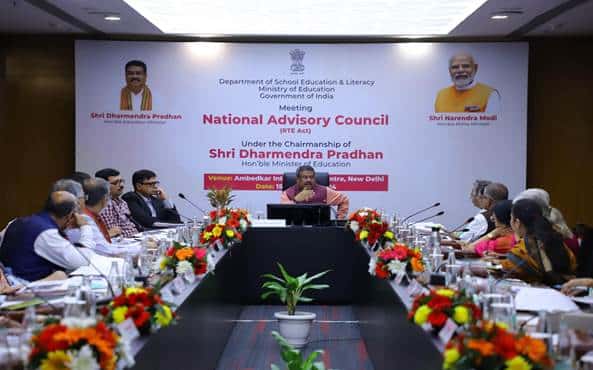Department of School Education & Literacy Holds National Conference

The Department of School Education and Literacy (DoSE&L) of the Government of India held a significant National Conference on Curricular and Assessment Equivalence of Boards and Improving Learning Outcomes at Sushma Swaraj Bhawan in New Delhi. The event gathered over 250 senior officials from various educational bodies, including the Ministry of Education and State Education Departments. Key discussions focused on enhancing learning outcomes and ensuring consistency across different school boards, aligning with the objectives of the National Education Policy (NEP) 2020.
Key Discussions and Objectives
The conference commenced with an address by Shri Anandrao V. Patil, Additional Secretary of DoSE&L, who highlighted the two main priorities of the NEP 2020: transitioning to competency-based learning and ensuring comparability among school boards. Shri Sanjay Kumar, Secretary of DoSE&L, chaired the event and emphasized the need for mechanisms that maintain consistency in assessments while allowing for local flexibility. He advocated for a collaborative approach to establish reliability in school evaluations, which is crucial as India progresses towards the goals set by the NEP 2020.
Prof. Dinesh Prasad Saklani, Director of NCERT, underscored the importance of the PARAKH initiative in facilitating informed educational reforms. He pointed out the necessity of aligning assessment methods with curricular goals and ensuring that data from large-scale assessments informs both policy and pedagogy. The discussions aimed to create a framework that supports effective learning outcomes across diverse educational systems.
Launch of the PARAKH Portal
A notable highlight of the conference was the launch of the PARAKH Rashtriya Sarvekshan Dissemination Portal. This platform provides open access to national and state-level data on student performance, serving as a vital resource for states and union territories to develop targeted improvement plans. Prof. Indrani Bhaduri, Head and CEO of PARAKH, presented findings from the 2024 Rashtriya Sarvekshan, revealing significant variations in student learning across states and districts. The insights emphasized foundational literacy and numeracy levels, subject-specific achievements, and effective interventions that have led to measurable improvements.
The conference also featured presentations from senior officials of six states and union territories, showcasing innovative strategies to enhance learning outcomes. These best practices highlighted the importance of local adaptations and data-driven approaches to education reform.
Equivalence of Boards and Quality Standards
The conference delved into the equivalence of boards concerning curriculum and assessment, focusing on the development of robust state-level frameworks. Senior officials from seven State Education Boards shared their strategies for establishing equivalence, outlining policies and processes designed to ensure fair evaluations across different educational systems. Shri Rahul Singh, Chairperson of the Central Board of Secondary Education (CBSE), discussed the board’s role in maintaining quality standards in schools, emphasizing self-evaluation and teacher development.
Prof. Indrani Bhaduri also outlined a strategic roadmap for achieving curricular and assessment equivalence, stressing its significance for fairness and consistency in student evaluations. She proposed the establishment of State School Standards Authorities (SSSAs) to ensure that all schools meet minimum quality benchmarks through transparent regulations.
Future Directions and Conclusion
The conference concluded with discussions on the implementation of Holistic Progress Cards (HPCs) and the introduction of Ready Reckoner Videos aimed at supporting schools in adopting child-centric evaluation approaches. These tools are designed to reinforce competency-based education and foster a culture of meaningful feedback for students.
A significant session addressed the recognition of school boards as awarding bodies for vocational courses. Ms. Prachi Pandey, Joint Secretary of SE&L, emphasized the need for seamless pathways between general and vocational education, which would enhance access to skill-based learning.
The event wrapped up with a vote of thanks from Ms. Anusree Raha, Deputy Secretary of DoSE&L, who acknowledged the contributions of all participants and reaffirmed the Ministry’s commitment to fostering collaboration among educational boards and institutions. The discussions reflected a collective determination to build an inclusive and equitable school education system focused on improving learning outcomes for all students.
Observer Voice is the one stop site for National, International news, Sports, Editor’s Choice, Art/culture contents, Quotes and much more. We also cover historical contents. Historical contents includes World History, Indian History, and what happened today. The website also covers Entertainment across the India and World.

